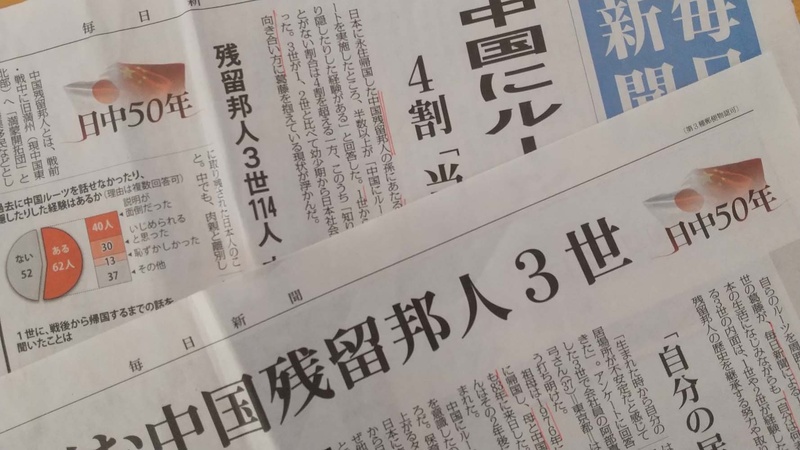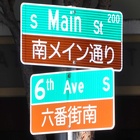Diplomatic relations between Japan and China were established in 1972. This September marks 50 years since the normalization of diplomatic relations between Japan and China, and a special feature has been published about the "China orphans" who were left behind in China and whose return to Japan was made possible by the normalization of diplomatic relations.
For many years, the government has conducted research on orphans left behind in China, provided assistance for their repatriation, and provided support for their lives after returning home. However, when we look back at the history of orphans left behind in China and their families, the identity issues that people who have lived between Japan and China have had come to light. There are similarities to the issues faced by Japanese people in the United States and South America.
When the Pacific War ended, many Japanese people were living in Manchuria (present-day northeastern China) as pioneer settlers, but when the Soviet Union entered the war against Japan, some Japanese orphans were left behind in China due to various reasons, such as separation from their parents (or loss of parents), and were then raised by Chinese people. These people are generally called Chinese orphans.
With the normalization of diplomatic relations between Japan and China, a project was started to investigate the identities of these orphans left behind in China and to support those who wished to return to Japan, and so far, over 6,700 people whose identities have been identified have returned to Japan permanently. Including their families, the number is over 20,000.
Those who left their parents at a young age and were raised by Chinese parents had few parental contacts and could not speak Japanese, so it was often difficult to confirm their identities. Even when their identities were finally identified, their parents were often already dead.
In the 1980s, I once covered a case where an orphan who had come to Japan to confirm his or her identity visited a Japanese person who he believed to be his or her parent. One orphan woman was visiting her parents in Shizuoka City, and she was able to see her elderly father, who was bedridden, for the first time in decades.
I've forgotten the details, but this woman was a baby during the chaotic period following Japan's defeat in the war, and was taken by her parents to Manchuria to escape. Because she was a baby, she would sometimes cry, but a Japanese soldier who was with her stabbed her in the throat with a bayonet, fearing that the Soviet soldiers might hear her. After that, she was separated from her parents and was thought to have died in the area, but she was protected and raised by a Chinese person.
When she visited Japan and met her father, one of the pieces of evidence that confirmed they were father and son was the scar on the woman's neck.
After going through these hardships, many of the remaining orphans finally managed to return to Japan, and not only did they come to Japan themselves, but their families did too. These families eventually started homes and had children in Japan. From the perspective of the orphans themselves, their grandchildren were already living in Japan. The total number of families who returned to Japan and their children and grandchildren born in Japan is estimated to be between 100,000 and 150,000.
Among these, an article (by reporter Iida Ken) summarizing the results of a questionnaire survey targeting the third generation, the grandchildren of the Japanese orphans left behind in China, was published in the Mainichi Shimbun on September 24th. The survey was conducted by the Mainichi Shimbun in July and August of this year through nationwide support groups and Japanese language classes for the second generation, and 114 men and women in their teens to fifties responded.
The survey allows us to learn what third-generation Japanese, whose grandparents were Chinese orphans left behind in China, who were raised by Chinese people and returned to Japan, know and think about their roots.
The survey results published in the paper can be summarized as follows:
The third generation respondents were roughly equal in number to those born in Japan and China, and over 90% had lived in Japan for over 10 years. In terms of educational background, just under 50% had a university or graduate school degree. Most, except for students, were employed, and nearly 80% answered that their economic situation was "comfortable" or "somewhat comfortable."
Regarding their own roots, in response to the question "Have you ever been unable to talk about or had to hide your Chinese roots in the past (multiple reasons allowed)?", 62 people answered "Yes," outnumbering the 52 who answered "No." Other reasons included "It was too much hassle to explain" (40 people), "I thought I would be bullied" (30 people), "I was embarrassed" (13 people), and "Other" (37 people).
In response to the question, "Have you ever heard of a first-generation Japanese person's story from the end of the war until they returned to Japan?", 67 people answered "Yes," while 47 people answered "No." Of these 47 people, 8 said they "really want to know," 30 said they "want to know a little," 8 said they "don't want to know," and 1 gave no answer.
Confronting "Who am I?"
In the survey, respondents were asked to write freely about "what kind of consideration they would like from those around them," and responses included "I want people to understand me as a person on an equal footing, regardless of my roots," and "I want people to know the history of the Japanese who remained behind in Japan."
In connection with this survey, the paper interviewed the third-generation Japanese who responded to the questionnaire and shared their thoughts.
One 37-year-old woman was born in Japan, her grandmother having been a Chinese orphan left behind in China and returning to Japan in 1976, and her parents also came to Japan in 1983. She felt that there was a lot of negative information about Chinese people in Japan, and she didn't want her parents to hear her awkward Japanese, so she wanted them to hide her origins.
In these kinds of complicated feelings and anguish about their roots, it seems that there are cases where they are unable to face the question of "who they are." In connection with this survey, the newspaper subsequently ran a three-part article titled "Between Me (Watashi) and Me (Wō): Third-generation Chinese orphans," introducing the lives of three third-generation Chinese orphans.
The book carefully records how, despite his anguish, he looked at his tools, traced their history, considered who he was, and sought out how he should live his life.
They are of Japanese and Chinese descent. Having two roots can be confusing even when one questions one's identity. The confusion is even more intense when war has caused two roots to conflict with each other, as was the case with Japanese Americans in the past. The anguish of the protagonist Ichiro in John Okada's novel "No-No Boy," which depicts a young second-generation Japanese-American during the war, is a symbol of this.
As the article states, when Japanese people's feelings towards China worsen, second and third generation Chinese people are forced to be conscious of their two roots and suffer greatly. However, it is also these people with two roots who can play a role as a bridge between two countries with different cultures and sometimes hostile to each other. Looking at it from another perspective, there is much that both Japanese and Chinese people can learn from them.
© 2022 Ryusuke Kawai







